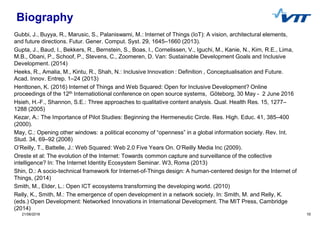Oss2016 henttonen
- 1. VTT TECHNICAL RESEARCH CENTRE OF FINLAND LTD Internet of Things and Web Squared: Open for Inclusive Development? OSS2016 Doctoral Consortium Katja Henttonen katja.henttonen@vtt.fi https://twitter.com/katjahenttonen
- 2. 221/06/2016 2 Content Background: IoT, “openness” and development Research questions Theoretical foundations Methodology
- 3. 321/06/2016 3 Internet of Things and Web Squared (“Third generation Internet”) • Expansion of Internet into physical “things” and even organisms • Effective storage and analysis of masses of data (uploaded by objects and people) • Many social and environmentalist IoT initiatives exists, although a niche Adapted from Oreste et al. 2013References: O’Reilly and Battelle 2009; Gubbi et al. 2013; Shin 2014
- 4. 421/06/2016 4 What is openness? Openness as a way to arrange social activities which favors: universal over restricted access universal over restricted participation and collaborative over centralized production Content Process People Openness Right to access Right to manipulate Participation Collaboration Transparency Contingency Picture based on Relly and Smith 2014 Definition by Smith and Elder 2010
- 5. 521/06/2016 5 Open development? Positive bottom-up change catalyzed by ‘open’ information- networked activities in international development ICT role in open development is two-fold: • Open ICT development (e.g. open source, open hardware) to address socio-economic goals • ICTs enabling other open process (e.g. participatory budgeting, open online education) Critiqued for failing to address the issue of power • How existing socio-economic power structures and capabilities define who can access, participate and collaborate? • Supporting bottom-up or consolidating the ‘top’? References: May 2009; Smith and Elder 2010; Relly and Smith 2014
- 6. 621/06/2016 6 Inclusive development and innovation? Inclusive development = societal development which emphasizes inclusion of previously disadvantaged groups as agents and beneficiaries of development Inclusive innovation = inventions which create value with/by/for the previously disadvantaged groups, particularly the poor Inclusion is in a key component in… socially sustainable development (exclusive systems do not create fair distribution) environmentally sustainable development (most ‘green’ innovations emerge bottom-up?). References: Heeks et al. 2010, Gubta el al. 2014
- 7. 721/06/2016 7 Preliminary research questions Research questions: • In what ways and to what extent can 3GI infrastructure and applications be open? • What factors drive or hinder the constructions of 3GI towards a degree of ‘openness’? • How does the ‘openness’ of 3GI influence the inclusivity of development outcomes? Purpose statement: To understand and conceptualize the role of openness in ‘making’ the 3rd generation Internet (3GI) to serve inclusive development Research questions and purpose statement are to be redefined during pilot study, focus on a domain and/or geographical area to be determined 3GI = third generation Internet
- 8. 821/06/2016 8 Conceptual framework Conceptual framework is built during an inductive pilot study. The framework will draw on studies of open ICT activities (open source etc.), open development and inclusive development In addition, it may build on one of the following: Political economy of technology (how political and economic power structures shape and are shaped by 3GI developments) New institutionalism (how design and evolution of 3GI influences and is influenced by conflicting institutional logics) Socio-technical transitions (on how 3GI as an innovation challenges existing socio-technical regimes) Acknowledgement: Thanks to prof. Richard Heeks (University of Manchester) for suggestions
- 9. 921/06/2016 9 Methodology • Inductive, exploratory ”pilot case” • Multiple interpretivist case studies, iterative circle • Data collection via interviews and participant observation • Data analysis with directed content analysis (possibly etnography) References: Kezar 2000; Hsieh and Shannon 2005
- 10. 1021/06/2016 10 Biography Gubbi, J., Buyya, R., Marusic, S., Palaniswami, M.: Internet of Things (IoT): A vision, architectural elements, and future directions. Futur. Gener. Comput. Syst. 29, 1645–1660 (2013). Gupta, J., Baud, I., Bekkers, R., Bernstein, S., Boas, I., Cornelissen, V., Iguchi, M., Kanie, N., Kim, R.E., Lima, M.B., Obani, P., Schoof, P., Stevens, C., Zoomeren, D. Van: Sustainable Development Goals and Inclusive Development. (2014) Heeks, R., Amalia, M., Kintu, R., Shah, N.: Inclusive Innovation : Definition , Conceptualisation and Future. Acad. Innov. Entrep. 1–24 (2013) Henttonen, K. (2016) Internet of Things and Web Squared: Open for Inclusive Development? Online proceedings of the 12th Internatiotional conference on open source systems, Göteborg, 30 May - 2 June 2016 Hsieh, H.-F., Shannon, S.E.: Three approaches to qualitative content analysis. Qual. Health Res. 15, 1277– 1288 (2005) Kezar, A.: The Importance of Pilot Studies: Beginning the Hermeneutic Circle. Res. High. Educ. 41, 385–400 (2000). May, C.: Opening other windows: a political economy of “openness” in a global information society. Rev. Int. Stud. 34, 69–92 (2008) O’Reilly, T., Battelle, J.: Web Squared: Web 2.0 Five Years On. O’Reilly Media Inc (2009). Oreste et al: The evolution of the Internet: Towards common capture and surveillance of the collective intelligence? In: The Internet Identity Ecosystem Seminar. W3, Roma (2013) Shin, D.: A socio-technical framework for Internet-of-Things design: A human-centered design for the Internet of Things, (2014) Smith, M., Elder, L.: Open ICT ecosystems transforming the developing world. (2010) Relly, K., Smith, M.: The emergence of open development in a network society. In: Smith, M. and Relly, K. (eds.) Open Development: Networked Innovations in International Development. The MIT Press, Cambridge (2014)
- 11. Thank you! Email: katja.henttonen@vtt.fi Twitter: @katjahenttonen











